
Automated Software Engineering
Scope & Guideline
Advancing the Future of Software Engineering
Introduction
Aims and Scopes
- Automation in Software Testing:
Research that explores automated methods for testing software, including automated test generation, regression testing, and fault localization. - Machine Learning Applications:
The application of machine learning techniques to various software engineering problems, such as defect prediction, code review, and requirement analysis. - Software Security and Vulnerability Detection:
Studies focused on identifying and mitigating vulnerabilities in software systems, including automated security testing and analysis of smart contracts. - Model-Driven Engineering:
Research on using models to automate aspects of software development, including model transformation, code generation, and requirements elicitation. - Human-Machine Collaboration:
Investigation into how human developers can collaborate with automated systems, including tools that enhance developer productivity and decision-making. - Advanced Software Architectures:
Explorations into new architectural paradigms for software systems, including microservices, cloud-based architectures, and embedded systems.
Trending and Emerging
- Deep Learning in Software Engineering:
There is a significant rise in the use of deep learning techniques for various software engineering tasks, including defect prediction, code generation, and sentiment analysis. - Automated Code Review and Analysis:
Recent publications emphasize the automation of code review processes, improving the efficiency and effectiveness of code quality assessments. - Quantum Software Engineering:
Emerging research is focusing on the unique challenges and methodologies associated with developing software for quantum computing environments. - Integration of AI in Development Processes:
The integration of artificial intelligence into software development is a growing theme, with studies exploring AI-assisted coding, debugging, and project management. - Security in Software Development:
The focus on software security, particularly in the context of automated vulnerability detection and analysis, is increasingly important in the current research landscape.
Declining or Waning
- Traditional Software Development Methodologies:
There is a noticeable decline in research focused on traditional methodologies such as waterfall or V-model approaches, as newer agile and automated frameworks gain traction. - Static Analysis Techniques:
Research on static code analysis appears to be decreasing, possibly due to the rise of more dynamic and machine learning-based approaches that provide better flexibility and insights. - Manual Testing Approaches:
As automation continues to dominate, the emphasis on manual testing techniques is diminishing, with fewer studies exploring traditional manual testing strategies. - Legacy Systems Maintenance:
The focus on maintaining and upgrading legacy systems is waning, as more research shifts towards modern development practices and cloud-native solutions. - Single-Platform Development:
Research concentrating on development for single platforms is decreasing, as there is a growing trend towards cross-platform and multi-device applications.
Similar Journals
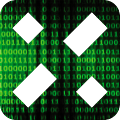
SoftwareX
Connecting Researchers to Transform Software PracticesSoftwareX is an innovative open-access journal published by Elsevier that has been championing advancements in the fields of Computer Science and Software since its inception in 2015. With a focus on presenting high-quality research, SoftwareX aims to foster collaboration and knowledge exchange among researchers and practitioners, advancing the way software and tools are developed and disseminated within the community. This journal operates under a flexible access model, allowing broad visibility and accessibility to its diverse readership. Positioned in the Q2 and Q3 quartiles of the Scopus ranking system within the domains of Computer Science Applications and Software respectively, SoftwareX stands as an influential platform for sharing cutting-edge methodologies and innovations. The journal's aim is not only to serve as a repository of knowledge but also to embolden practitioners and scholars alike to engage with and implement findings that can accelerate progress within the realms of software engineering and application. Situated in Amsterdam, Netherlands, SoftwareX has embraced an international reach, welcoming submissions that address complex challenges through novel software solutions.
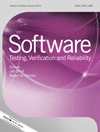
SOFTWARE TESTING VERIFICATION & RELIABILITY
Transforming Risk Management Through Scholarly CollaborationSOFTWARE TESTING VERIFICATION & RELIABILITY, published by Wiley, serves as a premier journal in the fields of software engineering, risk management, and quality assurance. With an ISSN of 0960-0833 and E-ISSN 1099-1689, this journal has been a pivotal resource since its inception in 1991, providing insights into the latest methodologies and technologies related to software testing and verification through to 2024. The journal is recognized for its rigorous peer-review process and boasts an impressive reputation, rated Q2 in Media Technology and Safety, Risk, Reliability and Quality, along with a Q3 rank in Software as of 2023. Its Scopus ranks further solidify its standing within the academic community, placing it in the 62nd and 43rd percentiles for Engineering and Computer Science, respectively. The journal fosters a collaborative environment for researchers, professionals, and students, encouraging the exploration of cutting-edge research, applications, and innovations in software testing and reliability, making it an invaluable asset for those seeking to advance their knowledge and expertise in this essential area.
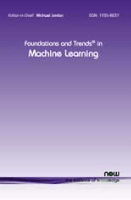
Foundations and Trends in Machine Learning
Unveiling Trends that Shape the Future of Machine LearningFoundations and Trends in Machine Learning is a premier academic journal published by NOW PUBLISHERS INC, specializing in the cutting-edge fields of artificial intelligence, human-computer interaction, and software engineering. Since its inception in 2008, this journal has established a formidable reputation, attaining a Q1 ranking in 2023 across all three categories in the Scopus index, confirming its place among the elite publications in these disciplines. With an exceptional impact reflected in its standing as the top-ranked journal in Computer Science for both Software and Artificial Intelligence, researchers and practitioners alike turn to this resource for in-depth reviews and foundational insights that drive progress in the rapidly evolving landscape of machine learning. While currently operating under traditional access options, the journal invites a diverse audience, including students, researchers, and industry professionals, to deepen their understanding and contribute to knowledge in this dynamic area of study.

Journal of Computer Languages
Advancing the Future of Computer LanguagesJournal of Computer Languages, published by ELSEVIER SCI LTD in the United Kingdom, serves as a crucial platform for advancing research and discussion in the fields of computer networks, human-computer interaction, and software development. With an ISSN of 2590-1184 and E-ISSN 2665-9182, this journal has established itself as a prominent resource within its category, achieving Q3 rankings in 2023 across its respective domains. As part of Scopus' indexed journals, it stands at impressive ranks of #152/395 in Computer Networks and Communications, #172/407 in Software, and #76/145 in Human-Computer Interaction, reflecting its relevance and contribution to the scholarly community. Operating under an open access model, the journal emphasizes accessibility and collaboration among researchers, professionals, and students keen on exploring innovative applications and advancements in computer languages. With a publication span extending from 2019 to 2024, the year-to-year growth reinforces its commitment to impacting both academia and industry significantly. Engage with cutting-edge research and foster your understanding in computer languages through this essential publication.
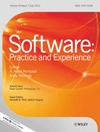
SOFTWARE-PRACTICE & EXPERIENCE
Advancing software knowledge through rigorous research.SOFTWARE-PRACTICE & EXPERIENCE, published by Wiley, is a prestigious journal that has significantly contributed to the field of software engineering since its inception in 1971. With a Q2 ranking in Software according to the 2023 category quartiles, it stands among the top tier of journals, positioned in the 79th percentile within Scopus’s Computer Science _ Software category. The journal focuses on disseminating high-quality research that reflects both academic rigour and practical application in software-related practices, ensuring that it remains relevant for researchers, professionals, and students alike. Although it does not currently offer Open Access options, it continues to provide invaluable insights and thorough explorations of contemporary issues in software development, methodology, and experience. As it converges toward 2024, SOFTWARE-PRACTICE & EXPERIENCE aims to foster a greater understanding of effective software practices in a rapidly evolving technological landscape.

JOURNAL OF INFORMATION SCIENCE AND ENGINEERING
Pioneering Research for Tomorrow's Technologies.JOURNAL OF INFORMATION SCIENCE AND ENGINEERING, published by the Institute of Information Science in Taiwan, is a pivotal platform for the dissemination of innovative research in the multidisciplinary fields of information science and engineering. Established in 1993, the journal primarily focuses on areas such as library and information sciences, human-computer interaction, hardware and architecture, as well as computational theory and software development. Despite holding a current Q4 ranking in several categories, the journal demonstrates significant potential for growth, particularly in computation and software systems, as evidenced by its Scopus rankings and percentiles. Researchers, professionals, and students will find this journal to be an invaluable resource to stay abreast of evolving theories and technologies in information science. The journal is accessible through traditional subscription models, fostering a broad academic outreach. It serves to enhance knowledge-sharing and collaboration within this dynamic and ever-evolving field.

PROGRAMMING AND COMPUTER SOFTWARE
Connecting Researchers and Practitioners in Software DevelopmentPROGRAMMING AND COMPUTER SOFTWARE is a distinguished journal committed to advancing the field of software development and programming methodologies. Published by PLEIADES PUBLISHING INC, this journal has been a valuable resource since its inception in 1978, reaching out to researchers, professionals, and students alike. With an emphasis on rigorous peer-reviewed articles, the journal holds a Q3 ranking in the realm of Software according to the latest 2023 Category Quartiles. Though it does not offer open access, the journal ensures that high-quality research is disseminated to its audience, providing insights into evolving programming techniques, software engineering challenges, and innovative solutions. With its convergence of years extending to 2024, PROGRAMMING AND COMPUTER SOFTWARE remains a pivotal publication, fostering a deeper understanding of the complexities in computer programming while supporting the broader software community.

Innovations in Systems and Software Engineering
Fostering Innovation in Systems DevelopmentInnovations in Systems and Software Engineering, published by Springer London Ltd, is a highly relevant journal dedicated to advancing the field of software engineering and systems innovation. With an ISSN of 1614-5046 and E-ISSN 1614-5054, this journal serves as a key platform for researchers and practitioners to share their insights, cutting-edge research, and developments from 2005 to 2024. Positioned in the Q3 category for software within the 2023 metrics and ranked #219 out of 407 in Scopus, the journal highlights its commitment to addressing the evolving challenges and opportunities in software systems. Although not open access, it maintains a rigorous peer-review process to ensure the dissemination of quality research. As the field continues to grow in complexity, Innovations in Systems and Software Engineering is vital for fostering collaboration and innovation among professionals, students, and researchers aiming to shape the future of software engineering.
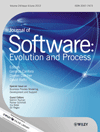
Journal of Software-Evolution and Process
Advancing the Frontiers of Software EvolutionThe Journal of Software-Evolution and Process, published by WILEY, is a premier academic journal dedicated to advancing knowledge in the field of software evolution and methodologies. With an impact factor that places it in the Q2 quartile of software-related research, this journal is widely recognized for its rigorous peer-reviewed articles that explore the dynamics of software development, maintenance, and transformation. Addressing the challenges faced by software engineers and researchers, the journal seeks to provide innovative insights and solutions, fostering both theoretical understanding and practical applications. Since its inception in 2012, Journal of Software-Evolution and Process has contributed significantly to the academic community, featuring research that is highly relevant to contemporary trends and technologies in the software industry. For those committed to enhancing their expertise, this journal provides an invaluable resource via open access options.

EMPIRICAL SOFTWARE ENGINEERING
Driving innovation in software engineering with rigorous empirical research.Empirical Software Engineering is a leading journal published by Springer, dedicated to advancing the science and practice of software engineering through empirical research. With an impressive impact factor in the Q1 quartile of the Software category and a Scopus ranking of #76 out of 407 journals, it occupies a prominent position within the field, attracting high-quality submissions from around the globe. Since its inception in 1996, the journal has provided a vital platform for disseminating critical findings that drive the evolution of software development methodologies and practices. While it is not an open-access journal, its rigorous peer-review process ensures that only the most impactful research reaches its readership, making it an essential resource for researchers, professionals, and students looking to stay at the forefront of software engineering innovations. Based in the Netherlands at Van Godewijckstraat 30, 3311 GZ Dordrecht, Empirical Software Engineering continues to set the standard for quality and significance in empirical studies of software systems and processes.